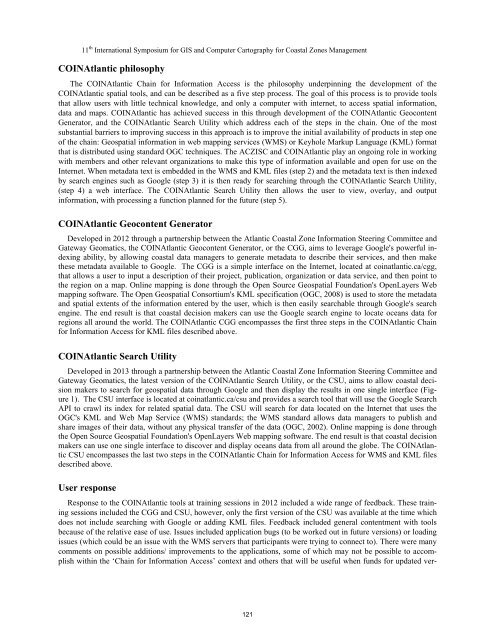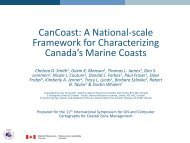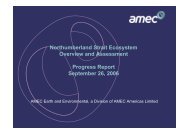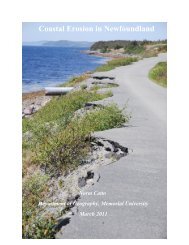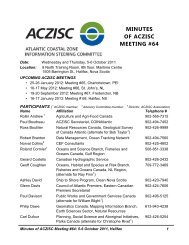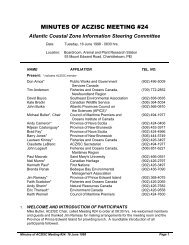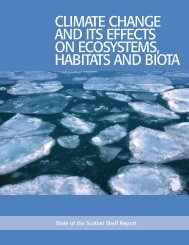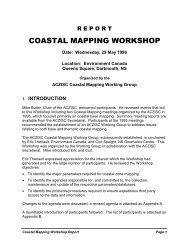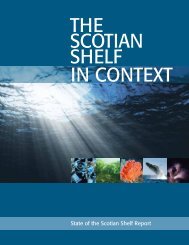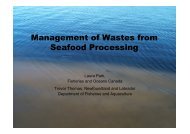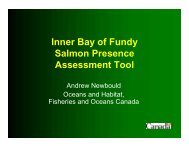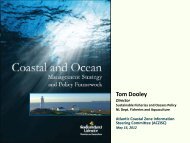Download PDF - COINAtlantic
Download PDF - COINAtlantic
Download PDF - COINAtlantic
- No tags were found...
Create successful ePaper yourself
Turn your PDF publications into a flip-book with our unique Google optimized e-Paper software.
11 th International Symposium for GIS and Computer Cartography for Coastal Zones Management<strong>COINAtlantic</strong> philosophyThe <strong>COINAtlantic</strong> Chain for Information Access is the philosophy underpinning the development of the<strong>COINAtlantic</strong> spatial tools, and can be described as a five step process. The goal of this process is to provide toolsthat allow users with little technical knowledge, and only a computer with internet, to access spatial information,data and maps. <strong>COINAtlantic</strong> has achieved success in this through development of the <strong>COINAtlantic</strong> GeocontentGenerator, and the <strong>COINAtlantic</strong> Search Utility which address each of the steps in the chain. One of the mostsubstantial barriers to improving success in this approach is to improve the initial availability of products in step oneof the chain: Geospatial information in web mapping services (WMS) or Keyhole Markup Language (KML) formatthat is distributed using standard OGC techniques. The ACZISC and <strong>COINAtlantic</strong> play an ongoing role in workingwith members and other relevant organizations to make this type of information available and open for use on theInternet. When metadata text is embedded in the WMS and KML files (step 2) and the metadata text is then indexedby search engines such as Google (step 3) it is then ready for searching through the <strong>COINAtlantic</strong> Search Utility,(step 4) a web interface. The <strong>COINAtlantic</strong> Search Utility then allows the user to view, overlay, and outputinformation, with processing a function planned for the future (step 5).<strong>COINAtlantic</strong> Geocontent GeneratorDeveloped in 2012 through a partnership between the Atlantic Coastal Zone Information Steering Committee andGateway Geomatics, the <strong>COINAtlantic</strong> Geocontent Generator, or the CGG, aims to leverage Google's powerful indexingability, by allowing coastal data managers to generate metadata to describe their services, and then makethese metadata available to Google. The CGG is a simple interface on the Internet, located at coinatlantic.ca/cgg,that allows a user to input a description of their project, publication, organization or data service, and then point tothe region on a map. Online mapping is done through the Open Source Geospatial Foundation's OpenLayers Webmapping software. The Open Geospatial Consortium's KML specification (OGC, 2008) is used to store the metadataand spatial extents of the information entered by the user, which is then easily searchable through Google's searchengine. The end result is that coastal decision makers can use the Google search engine to locate oceans data forregions all around the world. The <strong>COINAtlantic</strong> CGG encompasses the first three steps in the <strong>COINAtlantic</strong> Chainfor Information Access for KML files described above.<strong>COINAtlantic</strong> Search UtilityDeveloped in 2013 through a partnership between the Atlantic Coastal Zone Information Steering Committee andGateway Geomatics, the latest version of the <strong>COINAtlantic</strong> Search Utility, or the CSU, aims to allow coastal decisionmakers to search for geospatial data through Google and then display the results in one single interface (Figure1). The CSU interface is located at coinatlantic.ca/csu and provides a search tool that will use the Google SearchAPI to crawl its index for related spatial data. The CSU will search for data located on the Internet that uses theOGC's KML and Web Map Service (WMS) standards; the WMS standard allows data managers to publish andshare images of their data, without any physical transfer of the data (OGC, 2002). Online mapping is done throughthe Open Source Geospatial Foundation's OpenLayers Web mapping software. The end result is that coastal decisionmakers can use one single interface to discover and display oceans data from all around the globe. The <strong>COINAtlantic</strong>CSU encompasses the last two steps in the <strong>COINAtlantic</strong> Chain for Information Access for WMS and KML filesdescribed above.User responseResponse to the <strong>COINAtlantic</strong> tools at training sessions in 2012 included a wide range of feedback. These trainingsessions included the CGG and CSU, however, only the first version of the CSU was available at the time whichdoes not include searching with Google or adding KML files. Feedback included general contentment with toolsbecause of the relative ease of use. Issues included application bugs (to be worked out in future versions) or loadingissues (which could be an issue with the WMS servers that participants were trying to connect to). There were manycomments on possible additions/ improvements to the applications, some of which may not be possible to accomplishwithin the ‘Chain for Information Access’ context and others that will be useful when funds for updated ver-121


